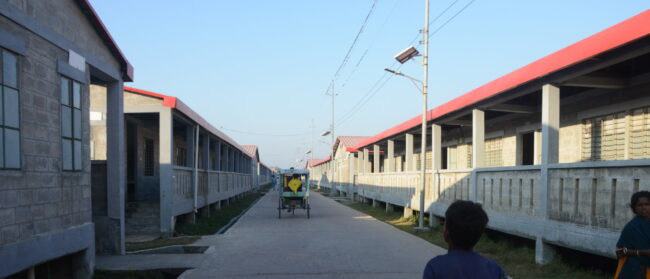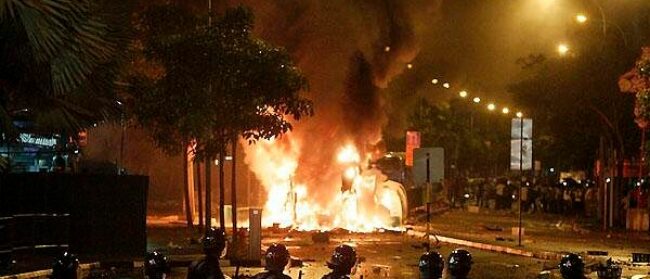While the world prepares to mark the New Year, Cambodian activists gathered on Friday in Phnom Penh for one last attempt of the year to free imprisoned unionists and political opposition supporters.
Hundreds of relatives of imprisoned unionists and political opposition supporters gathered on the morning of 30 December at the capital’s Freedom Park to call for the immediate release of the prisoners and the independence of the judiciary.
“My husband was arrested for his political beliefs. I am here to ask for his release and that of other union leaders and politicians,” said Prum Chantha, one of the lead protesters. Police arrested her husband – a member of the court-dissolved Cambodia National Rescue Party (CNRP) opposition – in May 2020 on charges of alleged treason and incitement against the government. Since then, her husband has been confined at Prey Sar prison on the outskirts of Phnom Penh.
“We have to keep fighting for our rights,” said Chantha, who has regularly demanded her husband’s release with an advocacy group commonly known as the Friday Women. “We can’t allow ourselves to give up.”
Shortly after the protests, the municipal authority issued a warning letter to Ouk Chhayavy, president of the Cambodian Independent Teacher Association (CITA) and to CITA’s steering committee threatening to take further authoritative measures if the association organises another protest without authorisation by the municipality.

Cambodian law requires protest organisers to inform the city hall of any upcoming rallies, but no formal authorisation is needed to hold protests in public spaces. Citizens legally have the free right to express themselves in-person or on social media, but activists say the past year only saw the state restrict civil liberties even further since the 2017 disbanding of the CNRP, the one serious electoral competitor to the ruling Cambodian People’s Party.
CITA held the protests this Friday despite multiple denied authorisations by the Phnom Penh Municipal Hall. Earlier this week, the city hall called in CITA’s representatives ordering them to change the subject of the protests from urging the release of all political activists to “demanding the release of only imprisoned teachers”.

The association submitted to the order and issued a second document demanding only the release of imprisoned teachers. Less than 48 hours before the scheduled protests, the city hall again rejected CITA’s request.
The protest continued through the morning as the crowd walked some six kilometres across the city towards the Phnom Penh Municipal Court to submit petitions to the court and Prime Minister Hun Sen urging the release of their relatives from prison.
When the crowd arrived in front of the court, it was contained by dozens of khaki-clad security officers. Chantha and prominent labour activist Rong Chhun, who is the president of the Cambodian Confederation of Unions, filed the petitions there with authorities who denied their attempt to walk further to the prime minister’s office.

Chhayavy pointed to high-profile crackdowns on organised labour at the NagaWorld casino complex in Phnom Penh as a key example of official control. Police arrested several NagaWorld unionists on New Year’s Eve last year, launching an often heavy-handed campaign over 2022 to suppress workers’ strikes and protests at the casino-hotels’ downtown facilities.
“We have the right to protest and to rally according to Cambodian law, but the authorities see us as troublemakers in society so they try to stop us with crackdowns and arrests,” Chhayavy said. “What we saw with the protests on labour rights at NagaWorld casino reflects that we have lost our independence and basic speech rights.”

Activists and human rights experts have long voiced “serious concerns” over what they say is the widespread use of Articles 494 and 495 of the Criminal Code on “incitement to commit a felony or cause social unrest” to silence political dissidents and reduce freedom of expression.
The CNRP was founded in 2012 and quickly became the most popular opposition party in Cambodia, but the Supreme Court in 2017 ordered its dissolution after a lower court levelled treason charges against party president Kem Sokha. Authorities have since carried out a series of arrests and mass trials against party leaders and supporters, whom officials have accused of plotting to overthrow the government of Hun Sen.
CITA was founded in 2000 and is now the most visible teachers’ union in the country, advocating not only for labour but also the rights of political prisoners and their families.
Chhayavy said the families of individuals imprisoned on political charges may face discrimination at work and school that pressures them into silence. Courts may also order the accused to compensate the government for criticising it under the charges of “public harassment”, she added, which further burdens struggling families.
On Friday, Chhun occasionally addressed the crowd as he held the Cambodian flag. He was also a member of the CNRP and spent more than two years in jail for incitement and defamation from 2005-21.
Speaking this week, he said the legal penalties that often follow critical speech in Cambodia do not come as any surprise to activists.
“Here, political and social advocates face three consequences: They are exiled, they get shot dead, they get arrested,” Chhun said.
Photos by Anton L. Delgado for Southeast Asia Globe.


